- Home
- Richard Powers
Bewilderment
Bewilderment Read online
BEWILDERMENT
a novel
RICHARD
POWERS
W.W. NORTON & COMPANY
Independent Publishers Since 1923
Those who contemplate the beauty of the earth find reserves of strength that will endure as long as life lasts.
—RACHEL CARSON
Therefore, for a similar reason, we must admit that the Earth, the sun, the moon, the ocean and all other things are not unique, but number in numbers beyond number.
—LUCRETIUS, DE RERUM NATURA
BEWILDERMENT
BUT WE MIGHT NEVER FIND THEM? We’d set up the scope on the deck, on a clear autumn night, on the edge of one of the last patches of darkness in the eastern U.S. Darkness this good was hard to come by, and so much darkness in one place lit up the sky. We pointed the tube through a gap in the trees above our rented cabin. Robin pulled his eye from the eyepiece—my sad, singular, newly turning nine-year-old, in trouble with this world.
“Exactly right,” I said. “We might never find them.”
I always tried to tell him the truth, if I knew it and it wasn’t lethal. He knew when I lied, anyway.
But they’re all over, right? You guys have proved it.
“Well, not exactly proved.”
Maybe they’re too far away. Too much empty space or something.
His arms pinwheeled as they did when words defeated him. We were closing in on bedtime, which didn’t help. I put my hand on his wild auburn mop. Her color—Aly’s.
“And what if we never heard a peep from out there? What would that say?”
He held up one hand. Alyssa used to say that when he concentrated, you could hear him whirring. His eyes narrowed, staring down into the dark ravine of trees below. His other hand sawed the cleft of his chin—a habit he resorted to when thinking hard. He sawed with such vigor I had to stop him.
“Robbie. Hey! Time to land.”
His palm pushed out to reassure me. He was fine. He simply wanted to run with the question for another minute, into the darkness, while still possible.
If we never heard anything, like ever?
I nodded encouragement to my scientist—easy does it. Stargazing was finished for tonight. We’d had the clearest evening, in a place known for rain. A full Hunter’s Moon hung fat and red on the horizon. Through the circle of trees, so sharp it seemed within easy reach, the Milky Way spilled out—countless speckled placers in a black streambed. If you held still, you could almost see the stars wheel.
Nothing definitive. That’s what.
I laughed. He made me laugh once a day or more, in good stretches. Such defiance. Such radical skepticism. He was so me. He was so her.
“No,” I agreed. “Nothing definitive.”
Now, if we did hear a peep. That would say tons!
“Indeed.” There would be time enough another night to say exactly what. For now, it was bedtime. He put his eye up to the barrel of the telescope for a last look at the shining core of the Andromeda Galaxy.
Can we sleep outside tonight, Dad?
I’d pulled him from school for a week and brought him to the woods. There had been more trouble with his classmates, and we needed a time-out. I couldn’t very well bring him all the way down to the Smokies only to deny him a night of sleeping outside.
We went back in to outfit our expedition. The downstairs was one great paneled room smelling of pine spritzed with bacon. The kitchen reeked of damp towels and plaster—the scents of a temperate rain forest. Sticky notes clung to the cabinets: Coffee filters above fridge. Use other dishes, please! A green spiral folder of instructions spread on the battered oak table: plumbing quirks, fuse box location, emergency numbers. Every switch in the house was labeled: Overhead, Stairs, Hallway, Kitchen.
Ceiling-high windows opened onto what, tomorrow morning, would be a rolling expanse of mountains beyond mountains. A pair of pilled rustic sofas flanked the flagstone fireplace, emblazoned with parades of elk, canoes, and bears. We raided the cushions, brought them outside, and laid them on the deck.
Can we have snacks?
“Bad idea, buddy. Ursus americanus. Two of them per square mile, and they can smell peanuts from here to North Carolina.”
No way! He held up a finger. But that reminds me!
He ran inside again and returned with a compact paperback: Mammals of the Smokies.
“Really, Robbie? It’s pitch-black out here.”
He held up an emergency flashlight, the kind you charge by cranking. It fascinated him when we arrived that morning, and he’d demanded an explanation of how the magic worked. Now he couldn’t get enough of making his own electrons.
We settled into our makeshift base camp. He seemed happy, which had been the whole point of this special trip. Lying down on beds spread out on the slats of the sagging deck, we said his mother’s old secular prayer out loud together and fell asleep under our galaxy’s four hundred billion stars.
I NEVER BELIEVED THE DIAGNOSES the doctors settled on my son. When a condition gets three different names over as many decades, when it requires two subcategories to account for completely contradictory symptoms, when it goes from nonexistent to the country’s most commonly diagnosed childhood disorder in the course of one generation, when two different physicians want to prescribe three different medications, there’s something wrong.
My Robin didn’t always sleep well. He wet the bed a few times a season, and it hunched him over with shame. Noises unsettled him; he liked to turn the sound way down on the television, too low for me to hear. He hated when the cloth monkey wasn’t on its perch in the laundry room above the washing machine. He poured every dollar of allowance into a trading card game—Collect them all!—but he kept the untouched cards in numeric order in plastic sleeves in a special binder.
He could smell a fart from across a crowded movie theater. He’d focus for hours on Minerals of Nevada or the Kings and Queens of England—anything in tables. He sketched constantly and well, laboring over fine details lost on me. Intricate buildings and machines for a year. Then animals and plants.
His pronouncements were off-the-wall mysteries to everyone except me. He could quote whole scenes from movies, even after a single viewing. He rehearsed memories endlessly, and every repetition of the details made him happier. When he finished a book he liked, he’d start it again immediately, from page one. He melted down and exploded over nothing. But he could just as easily be overcome by joy.
On rough nights when Robin retreated to my bed, he wanted to be on the side farthest from the endless terrors outside the window. (His mother had always wanted the safe side, too.) He daydreamed, had trouble with deadlines, and yes, he refused to focus on things that didn’t interest him. But he never fidgeted or dashed around or talked without stopping. And he could hold still for hours with things he loved. Tell me what deficit matched up with all that? What disorder explained him?
The suggestions were plentiful, including syndromes linked to the billion pounds of toxins sprayed on the country’s food supply each year. His second pediatrician was keen to put Robin “on the spectrum.” I wanted to tell the man that everyone alive on this fluke little planet was on the spectrum. That’s what a spectrum is. I wanted to tell the man that life itself is a spectrum disorder, where each of us vibrated at some unique frequency in the continuous rainbow. Then I wanted to punch him. I suppose there’s a name for that, too.
Oddly enough, there’s no name in the DSM for the compulsion to diagnose people.
When his school suspended Robin for two days and put their own doctors on the case, I felt like the last reactionary throwback. What was there to explain? Synthetic clothing gave him hideous eczema. His classmates harassed him for not understanding their vicious gossip. His mother was
crushed to death when he was seven. His beloved dog died of confusion a few months later. What more reason for disturbed behavior did any doctor need?
Watching medicine fail my child, I developed a crackpot theory: Life is something we need to stop correcting. My boy was a pocket universe I could never hope to fathom. Every one of us is an experiment, and we don’t even know what the experiment is testing.
My wife would have known how to talk to the doctors. Nobody’s perfect, she liked to say. But, man, we all fall short so beautifully.
HE WAS A BOY, so naturally he wanted to see Hillbilly Vegas. Three towns jammed together with two hundred places to order pancakes: What’s not to love?
We drove from the cabin, down seventeen winding miles along a stunning river. It took us almost an hour. Robin watched the water, scanning the rapids from the back seat. Wildlife bingo. His new favorite game.
Tall bird! He called out.
“What kind?”
He flipped through his field guide. I was afraid he might get carsick. Heron? He turned back to the river. Half a dozen more curves and he shouted again.
Fox! Fox! I saw him, Dad!
“Gray or red?”
Gray. Oh, man!
“The gray fox climbs persimmon trees to eat the fruit.”
No way. He looked it up in his Mammals of the Smokies. The book confirmed me. He groaned and slugged my arm. How do you know all this stuff, anyway?
Skimming his books before he woke up helped me keep one step ahead of him. “Hey. I am a biologist, aren’t I?”
Ass . . . trobiologist.
His grin tested whether he’d just crossed a terrible line. I gaped, equal parts stunned and amused. His problem was anger, but it almost never turned mean. Honestly, a little meanness might have protected him.
“Whoa, mister. You just missed getting a time-out for the rest of your eighth year on Earth.”
His grin firmed, and he returned to scouting the river. But a mile down that winding mountain road, he put his hand on my shoulder. I was just joking, Dad.
I watched the road and told him, “Me, too.”
We stood in line for the Ripley’s Odditorium. The place unnerved him. Kids his age ran all over, forming bands of improvised mayhem. Their screaming made Robbie wince. Thirty minutes of the horror show and he begged me to leave. He did better with the aquarium, even if the stingray he wanted to sketch wouldn’t hold still for its portrait.
After a lunch of french fries and onion rings, we took the lift to the sky platform. He almost vomited all over the glass floor. White-knuckled, jaw clenched, he declared it fantastic. Back in the car, he seemed relieved to have gotten Gatlinburg out of the way.
He was thoughtful on the drive back to the cabin. That would not have been Mom’s favorite place on the face of the planet.
“No. Probably not even in her top three.”
He laughed. I could get him to laugh, if I chose my moments.
That night was too cloudy for stargazing, but we slept outside again, on our rustic cushions with their parades of elk and bear. Two minutes after Robin snapped off his flashlight I whispered, “Your birthday tomorrow.” But he was asleep already. I recited his mother’s prayer softly for the both of us, so I could reassure him if he woke up horrified at forgetting.
HE WOKE ME IN THE NIGHT. How many stars did you say there are?
I couldn’t be angry. Even yanked from sleep, I was glad he was still stargazing.
“Multiply every grain of sand on Earth by the number of trees. One hundred octillion.”
I made him say twenty-nine zeros. Fifteen zeros in, his laughter turned to groans.
“If you were an ancient astronomer, using Roman numerals, you couldn’t have written the number down. Not even in your whole lifetime.”
How many have planets?
That number was changing fast. “Most probably have at least one. Many have several. The Milky Way alone might have nine billion Earth-like planets in their stars’ habitable zones. Add the dozens of other galaxies in the Local Group . . .”
Then, Dad . . . ?
He was a boy attuned to loss. Of course the Great Silence hurt him. The outrageous size of emptiness made him ask the same question Enrico Fermi did over that famous lunch in Los Alamos, three quarters of a century ago. If the universe were larger and older than anyone could imagine, we had an obvious problem.
Dad? With all those places to live? How come nobody’s anywhere?
IN THE MORNING I PRETENDED I’d forgotten what day it was. My new nine-year-old saw through me. While I made super-deluxe oatmeal with half a dozen mix-ins, Robin bobbed in place, pushing off the counter and pogo-sticking with excitement. We set a land speed record eating.
Let’s open the presents.
“The what? You’re making a pretty big assumption, aren’t you?”
Not assumption. Hypothesis.
He knew what he was getting. He’d been bargaining with me for months: a digital microscope that attached to my tablet and let him display magnified images on the screen. He spent all morning trying out pond scum, cells from inside his cheek, and the underside of a maple leaf. He would have been happy looking at samples and sketching notes into his notebook for the remainder of our vacation.
Afraid of pushing him over the top, I wheeled out the cake I’d bought on the sly at the little 1950s grocery store at the bottom of the mountain. His face shone before he caught himself.
Cake, Dad?
He made a beeline for the box, which I’d failed to hide. He studied the ingredients, shaking his head.
Not vegan, Dad.
“Robbie. It’s your birthday. That only happens, what . . . ? Barely once a year?”
He refused to smile. Butter. Dairy products. Egg. Mom would not have gone for it.
“Oh, I watched your mother eat cake, on more than one occasion!”
I regretted the words as soon as they left my mouth. He looked like a timid squirrel, not sure whether to take the outstretched goodness that he craved or to flee back into the woods.
When?
“She made exceptions now and then.”
Robin stared at the cake, a carroty, sinless thing whose virtue would have disgusted any other child. His brief little birthday Eden had just been overrun with snakes.
“It’s okay, champ. We can feed it to the birds.”
Well. We could try a little, first?
We did. Every time the taste of cake made him happy, he caught himself and grew thoughtful again.
How tall was she?
He knew her height. But today he needed a number.
“Five-foot-two. You’ll pass her, before long. She was a runner, remember?”
He nodded, more to himself than to me. Small but mighty.
She called herself that, when gearing up to go do battle at the Capitol. I liked to call her “compact, but planetary.” Stolen from a Neruda sonnet I once recited to her on an autumn night that ended in a winter. I had to resort to some other man’s words to ask her to marry me.
What did you call her?
It always rattled me when he read my mind. “Oh, all kinds of things. You remember.”
But like what?
“Like Aly for Alyssa. And Ally, because she was my ally.”
Miss Lissy.
“She never liked that one.”
Mom. You called her Mom!
“Sometimes. Yes.”
That is so flipping weird. I reached out to rough his hair. He jerked away but gave me a pass. How did I get my name again?
He knew how he got his name. He’d heard the story more often than was healthy. But he hadn’t asked for months, and I didn’t mind repeating it.
“On our first date, your mother and I went birding.”
Before Madison. Before everything.
“Before everything. Your mother was brilliant! She kept spotting them left and right. Warblers and thrushes and flycatchers—every one of those birds was an old friend. She didn’t even have to see them
. She knew them by ear. Meanwhile, there I was, poking around, stumbling over these confusing little brown jobs that I couldn’t tell apart . . .”
Wishing you’d asked her to the movies?
“Ah. So you have heard this one before.”
Maybe.
“At last I saw an amazing patch of bright orange-red. I was saved. I started shouting, Ooh, ooh, ooh!”
And Mom said, “What do you see? What do you see?”
“She was very excited for me.”
Then you swore.
“I may have sworn, yes. I was so humiliated. ‘Gee. Sorry. It’s only a robin.’ I figured I’d never see this woman again.”
He waited for the punch line that, for some reason, he needed to hear out loud once more.
“But your mother was looking through her binoculars like my find was the single most exotic life-form she’d ever seen. Without taking her eyes off it, she said, ‘The robin is my favorite bird.’ ”
That’s when you fell in love with her.
“That’s when I knew I wanted to spend as much time around her as I could. I told her so, later, when I knew her better. We started saying it all the time. Whenever we were doing anything together—reading the paper or brushing our teeth or doing the taxes or taking out the trash. Whatever blah or boring thing we were taking for granted. We’d trade a look, read each other’s minds, and one of us would blurt out, ‘The robin is my favorite bird!’ ”
He stood and stacked his dish onto mine, brought them to the sink, and turned on the faucet.
“Hey! It’s your birthday. My turn to wash dishes.”
He sat back down across from me with his Look me in the eye look.
Can I ask you something? No lies. Honesty is important to me, Dad. Was the robin actually her favorite bird?
I didn’t know how to be a parent. Most of what I did, I remembered from what she used to do. I made enough mistakes on any one day to scar him for life. My only hope was that all the errors somehow canceled each other out.

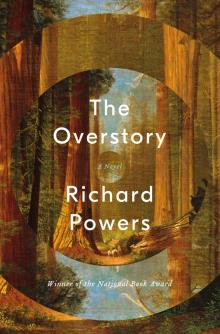 The Overstory
The Overstory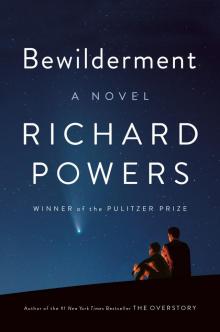 Bewilderment
Bewilderment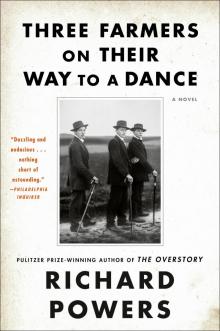 Three Farmers on Their Way to a Dance
Three Farmers on Their Way to a Dance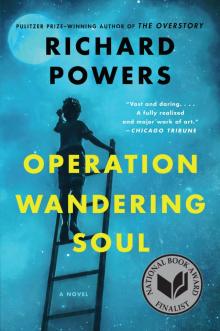 Operation Wandering Soul
Operation Wandering Soul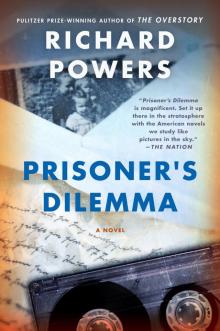 Prisoner's Dilemma
Prisoner's Dilemma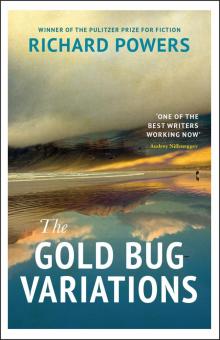 The Gold Bug Variations
The Gold Bug Variations Generosity: An Enhancement
Generosity: An Enhancement The Echo Maker
The Echo Maker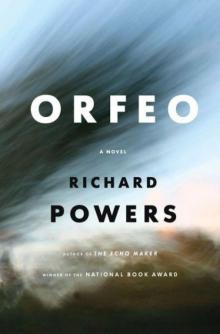 Orfeo
Orfeo The Time of Our Singing
The Time of Our Singing PLOWING THE DARK
PLOWING THE DARK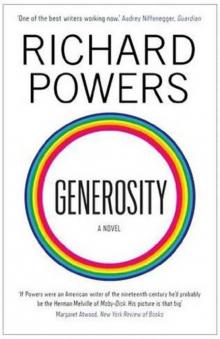 Generosity
Generosity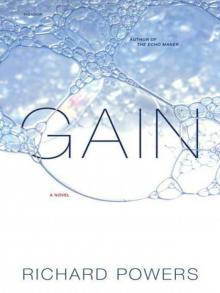 Gain
Gain